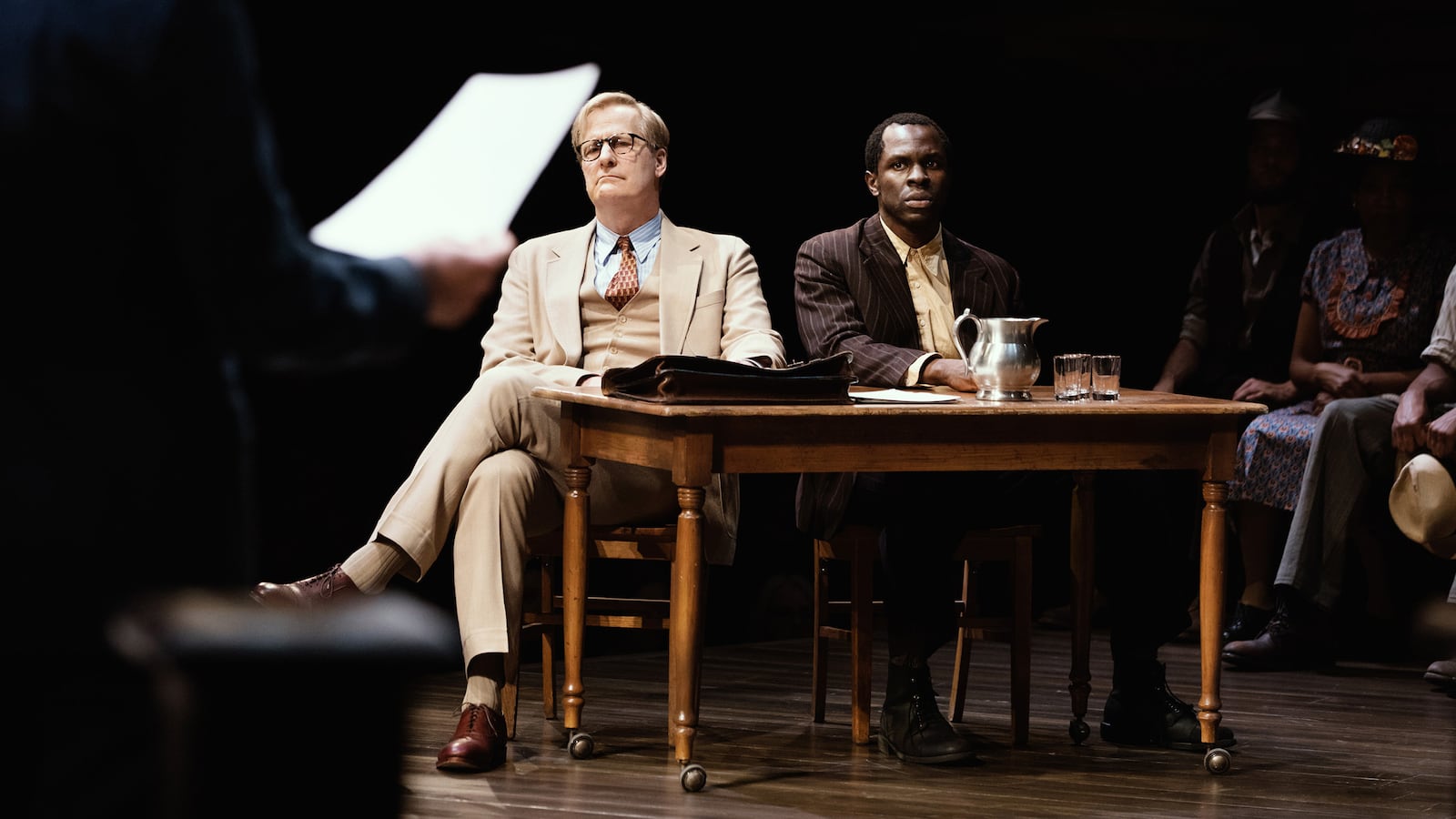However you feel about Aaron Sorkin’s adaptation of To Kill a Mockingbird, which opened on Broadway tonight, you are most certainly not in Harper Lee’s original setting of Maycomb, Alabama, in 1933 to 1935; or the Maycomb as imagined by director Robert Mulligan when he made Lee’s 1960 novel into the 1962 movie, starring Gregory Peck as the unimpeachably principled and upstanding lawyer Atticus Finch.
Jeff Daniels plays Finch on stage; the two men share a predilection for light-colored suits but little else. Peck won an Oscar for his role, and the book and film remain fiercely cherished American classics; pop-cultural landmarks about racism, prejudice, and injustice released in the Civil Rights era. This, amazingly, is its first ever production on Broadway.
Full disclosure: This critic is not American. My U.S. friends speak about reading the book aged around 12, or of seeing the film, some in the early 1960s, and how impactful it was. Which is to say: My cultural-emotional hard-wiring watching the play may be different to many reading this and seeing the play.
Sorkin’s Maycomb looks the same, and stretches of his script sound the same as the novel and movie, but this play significantly puts Atticus Finch’s liberalism on trial alongside the trial of Tom Robinson (Grenga Akinnagbe), the black man charged with rape whom Finch represents.
There is no mention of the racism that Lee imagined Atticus possessing in Go Set a Watchman, published amid great hype and controversy in 2015, but the play represents another sharp dent in the cultural hero’s moral armor. (One of its producers is Barry Diller, chairman of IAC, which owns The Daily Beast.)
This Atticus, these black characters, remain in 1933, but have been imagined for us in an era of Ferguson, Michael Brown, police violence, and Trump administration-stained prejudice.
Sorkin’s casting anew is not total, and it takes place alongside some well-placed memory jabs evoked through Miriam Beuther’s period design, featuring sections of houses on cinder blocks, and a circular courtroom. The play doesn’t have full sets, but elements of sets that whizz up from and across the stage.
The child characters (Scout and Jem, Atticus’ children, and Dill) are played by adults. Some have said this is jarring; it worked fine for me. Bartlett Sher’s direction, however, is too languid: the tension of the book and film—what happened at the time versus what an adult Scout, as a narrator, knows—is missing. The play plods just as much as Atticus.
You are thankful for the ball of energy and inquiry that is Celia Keenan-Bolger’s Scout. Keenan-Bolger is a wonderful guide for the play’s audience, just as her character is in the book and the film. Keenan-Bolger, just like the movie’s Mary Badham, projects a fierce self-possession, a severe wedge-bob, a genderless defiance and derring-do where a girlish sweetness never was, and a fierce loyalty to her father which saves both his and Tom Robinson’s lives.
One of the sharpest moments featuring Keenan-Bolger sees her patrolling the courtroom, a narrative ghost, empathetically observing the pain of Robinson’s accuser Mayella Ewell (Erin Wilhelmi), this past her own anger, our anger, at what Scout (and we) presume to be Mayella’s lies at the service of her racist and violent father Bob Ewell (Frederick Weller).
Atticus’ liberal pieties and principles are interrogated, rather than placed on a pedestal. Both his black housekeeper Calpurnia (an excellent LaTanya Richardson Jackson) and his son Jem (Will Pullen) question exactly where Atticus’ high-minded belief in people’s essential goodness and the necessity of behaving properly—even towards those who mean you and your loved ones harm—leaves him and those around him.
Calpurnia repeats Atticus' words back to him with curdling disdain; Jem tries to rouse his father from his good-guy somnambulance.
Daniels’ Atticus is folksy and ruffled, without Peck’s idealistic though hardened eye. He keeps his head down. He doesn’t want to confront anything. Daniels plays him as a man in eternal retreat, even if he is confronting racism in its most dangerous form. Daniels’ Atticus is there and also absent, while everyone around him wants him to look up, be present, take a more obvious stand.
Positively speaking, Sorkin’s redrafting gives, where the book and film do not, some agency and a voice to Calpurnia and Robinson. The black characters are no longer silent and acted-upon observers of the injustice and prejudice aimed against them. Jem is also given a more galvanizing role; he cannot believe his father’s passivity, indeed is disgusted by it.
The third of the children’s band, Gideon Glick’s Dill Harris, is transformed into a camp young man, with a “I-do-declare” breathiness. Dill’s sexuality was never alluded to in the novel, and in the film he is more a curious child, but what Glick and Sorkin perhaps imagine here is the young Truman Capote, Lee’s friend and her inspiration for Dill.
The unstated isolation of a possibly gay young man gives the character a moving anchor for his relationship with Atticus, a father figure he is all too ready to support and emulate.
Dill is almost alone in this hero worship. All the questions of Atticus you ever wanted to ask are asked; a character is interrogated for his lacking fire retrospectively.
Yet at two key moments Sorkin’s Atticus is given a fresh edge and ballsiness in both courtroom and outside it, but they are eruptions in isolation. They don’t cohere to the main Atticus lifted from book and movie. In its implicit trial of Atticus Finch, the To Kill a Mockingbird of 2018 finds the defendant guilty.
The new elements make sense in the play in isolation, but they do not make sense in the context of where the book and film faithfully set their action, and faithfully imagined their hero. Lee may seem outdated now and in need of redrafting for a 2018 audience, but to what end?
It is right to ask questions of Atticus Finch. It is right to break the enforced silence of To Kill a Mockingbird’s black characters. But why not write a completely new play to do that? The Broadway Atticus is familiar until he isn't, but the aspects of New Atticus aren't sufficiently explained or developed to make proper sense.
Sorkin doesn’t change the result of the trial, or any of the major plot points of Lee’s novel and Mulligan’s movie (although notably absent is next-door neighbor Miss Maudie, whose relationship with Atticus is never made clear, but who you hope is secretly having fun with the buttoned-up lawyer).
But Sorkin, in his additions, also takes To Kill a Mockingbird away from itself; by not showing the silence of the black characters, by not keeping Atticus Finch as the unalloyed stoic, he is speaking for and to us, a modern audience, for sure. But he is also lessening, or off-setting, the injustices of a specific historical period, as viewed by a white writer of that time.
Watching this To Kill a Mockingbird, you know why Sorkin did it, and why he felt he had to do it. A modern theatre audience would feel extremely uncomfortable, even angry, watching a To Kill a Mockingbird with all its narrative antiquities, but that arguably would have been a more powerful indictment than this play and its well-meaning adjustments and interjections.
Another option for Sorkin would have been to meet To Kill a Mockingbird in its own era and to expect us to meet in its own era; to leave it where it is, and for us to feel the outrage it intends—the outrage of then, added and filtered with the outrage we know now.
Given the present political and cultural climate, the painful injustices of the play feel acute for sure, but its questioning of Atticus doesn't develop enough to reach its own convincing, fresh conclusion. If there's one worse thing you can do to a classic than totally reimagine it, it's to tinker with it.
To Kill a Mockingbird is at the Shubert Theatre, NYC, booking through July 7.






